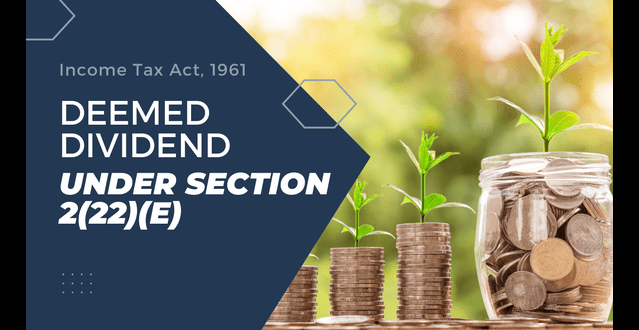
Deemed Dividend under Section 2(22)(e) of the Income Tax Act, 1961
Dividends are a method by which companies reward their shareholders, typically paid out of the company’s profits and taxed in the hands of shareholders. However, certain transactions or benefits provided to shareholders can be treated as dividends for tax purposes, even if they are not formally declared. These are known as deemed dividends, governed by Section 2(22)(e) of the Income Tax Act, 1961.
What is a Deemed Dividend?
A deemed dividend is an income considered as a dividend for tax purposes, even if it is not formally distributed by a closely held company. The Income Tax Act specifies certain transactions that are deemed to be dividends under Section 2(22)(e).
Applicability
Deemed dividends apply only to private limited companies or companies in which the public is not substantially interested, also known as closely held companies. They do not apply to public limited companies.
How Does a Deemed Dividend Work?
Deemed dividends arise when a closely-held company provides a loan or an advance to:
- Any shareholder holding more than 10% of the voting power.
- Any concern in which such a shareholder has a substantial interest.
- For the individual benefit of such shareholders.
- On behalf of such shareholders.
The loan or advance should be given from the company’s accumulated profits. The amount deemed as a dividend is limited to the extent of these accumulated profits.
Example: If ABC Pvt Ltd, a closely held company, has accumulated profits of Rs. 25 lakhs as of March 31, 2024, and grants a loan of Rs. 10 lakhs to Hari, a shareholder with 15% shares, this Rs. 10 lakhs will be treated as deemed dividends for Hari under Section 2(22)(e).
Section 2(22)(e) of the Income Tax Act
This section defines “dividend” to include payments by a company, not publicly held, in the form of advances or loans to substantial shareholders. The conditions are:
- The payment must be made after May 31, 1987.
- It includes payments to shareholders with more than 10% voting power or to concerns where such shareholders have a substantial interest.
- It applies to payments for the individual benefit of such shareholders.
Taxability of Deemed Dividend
Before April 2018, companies paid Dividend Distribution Tax (DDT) on regular dividends, while shareholders did not. Deemed dividends given as loans were not subject to DDT, allowing tax evasion. To counter this, the Union Budget of 2018 mandated DDT on deemed dividends as well. However, DDT was abolished in the 2021 Union Budget, making dividend income taxable in the hands of shareholders.
Who Pays Tax on Deemed Dividends?
The tax treatment varies based on the recipient and the nature of the transaction:
Recipient Type | Transaction | Tax Treatment |
Individual shareholder | Loan or advance | Taxable as income from other sources at applicable slab rates |
Concern with substantial shareholder interest | Loan or advance | Taxable as income from other sources at applicable slab rates |
Individual shareholder | Payment for individual benefits | Taxable as income from other sources at applicable slab rates |
Closely-held company | Loan or advance from another closely-held company | Taxable as income from other sources at 30% plus surcharge and cess |
Public limited company | Loan or advance from a closely-held company | Not taxable as Section 2(22)(e) does not apply |
Note: The closely-held company giving the loan or advance does not pay DDT on deemed dividends.
Exceptions to Deemed Dividends
Some transactions are excluded from the deemed dividend provisions:
- Loans or advances by a company in the business of money lending, given in the ordinary course of business.
- Loans or advances adjusted against dividends declared and distributed.
- Loans or advances converted into equity shares under certain conditions.
- Loans or advances to a director for company business expenses.
- Loans or advances to an employee for personal expenses under specific conditions.
Deemed Dividends vs Actual Dividends
Aspect | Deemed Dividend | Actual Dividend |
Applicable Companies | Closely held companies | Public companies |
Distribution Type | Loans and advances | Dividends |
Shareholder Requirement | >10% voting power | All shareholders |
Tax Rate | 30% + cess and surcharge | 15% if dividend > Rs. 5,000 |
Deemed dividends prevent tax avoidance by treating certain transactions as dividends for tax purposes. Taxpayers should be aware of the implications and exceptions to avoid unintended tax liabilities. Consulting a tax professional is advisable for navigating the complexities of deemed dividend provisions.
Share this guide with colleagues or friends to benefit from this valuable information. For further assistance, contact filingsfirst.com

